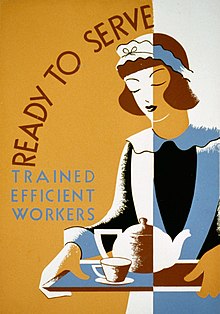
Homemaking is mainly an American and Canadian term for the management of a home, otherwise known as housework, housekeeping, housewifery or household management. It is the act of overseeing the organizational, day-to-day operations of a house or estate, and the managing of other domestic concerns. A person in charge of the homemaking, who is not employed outside the home, in the US and Canada, is called a homemaker, a term for a housewife or a househusband. Historically the role of homemaker was often assumed by women. The term "homemaker", however, may also refer to a social worker who manages a household during the incapacity of the housewife or househusband. Home health workers assume the role of homemakers when caring for elderly individuals. This includes preparing meals, giving baths, and any duties the person in need cannot perform for themselves.
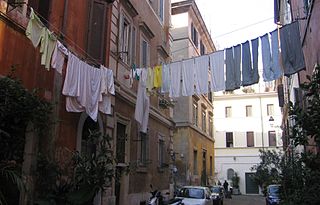
Laundry is the washing of clothing and other textiles, and, more broadly, their drying and ironing as well. Laundry has been part of history since humans began to wear clothes, so the methods by which different cultures have dealt with this universal human need are of interest to several branches of scholarship.

Cleaning is the process of removing unwanted substances, such as dirt, infectious agents, and other impurities, from an object or environment. Cleaning is often performed for aesthetic, hygienic, functional, safety, or environmental protection purposes. Cleaning occurs in many different contexts, and uses many different methods. Several occupations are devoted to cleaning.

A nanny is a person who provides child care. Typically, this care is given within the children's family setting. Throughout history, nannies were usually servants in large households and reported directly to the lady of the house. Today, modern nannies, like other domestic workers, may live in or out of the house, depending on their circumstances and those of their employers. Some employment agencies specialize in providing nannies, as there are families that specifically seek them and may make them a part of the household.

A domestic worker is a person who works within a residence and performs a variety of household services for an individual, from providing cleaning and household maintenance, or cooking, laundry and ironing, or care for children and elderly dependents, and other household errands. The term "'domestic service" applies to the equivalent occupational category. In traditional English contexts, such a person was said to be "in service".

A maid, housemaid, or maidservant is a female domestic worker. In the Victorian era, domestic service was the second-largest category of employment in England and Wales, after agricultural work. In developed Western nations, full-time maids are now typically only found in the wealthiest households. In other parts of the world, maids remain common in urban middle-class households.
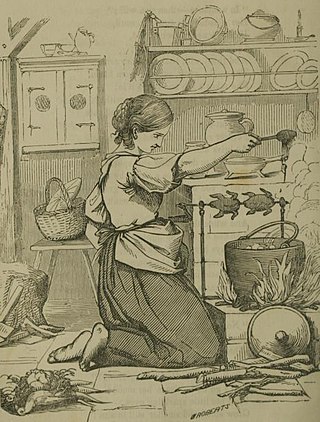
A cook or private chef is a household staff member responsible for food preparation.

A housekeeper is an individual responsible for the supervision of a house's cleaning staff. The housekeeper may also perform the cleaning duties themself.
Housekeeping is the management and routine support activities of running and maintaining an organized physical institution occupied or used by people, like a house, ship, hospital or factory, such as cleaning, tidying/organizing, cooking, shopping, and bill payment. These tasks may be performed by members of the household, or by persons hired for the purpose. This is a more broad role than a cleaner, who is focused only on the cleaning aspect. The term is also used to refer to the money allocated for such use. By extension, it may also refer to an office or a corporation, as well as the maintenance of computer storage systems.

In great houses, scullery maids were the lowest-ranked and often the youngest of the female domestic servants and acted as assistants to a kitchen maid.
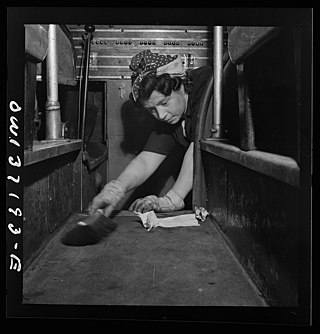
A charwoman is an occupational term, referring to a paid part-time worker who comes into a house or other building to clean it for a few hours of a day or week, as opposed to a maid, who usually lives as part of the household within the structure of domestic service. A charwoman might work independently, often for cash in hand, or might come through an employment agency.

In developing countries and some areas of more developed countries, energy poverty is lack of access to modern energy services in the home. In 2022, 759 million people lacked access to consistent electricity and 2.6 billion people used dangerous and inefficient cooking systems. Their well-being is negatively affected by very low consumption of energy, use of dirty or polluting fuels, and excessive time spent collecting fuel to meet basic needs.

A cleaner or a cleaning operative is a type of industrial or domestic worker who does the cleaning.
Women's work is a field of labour assumed to be solely the realm of women and associated with specific stereotypical jobs considered as uniquely feminine or domestic duties throughout history. It is most commonly used in reference to the unpaid labor typically performed by that of a mother or wife to upkeep the home and children.
A service voucher is a financial instrument which allows a public authority to target social services at those it deems in need, and at the same time to promote employment and labour market integration. It effectively boosts demand for certain services which meet social policy objectives.
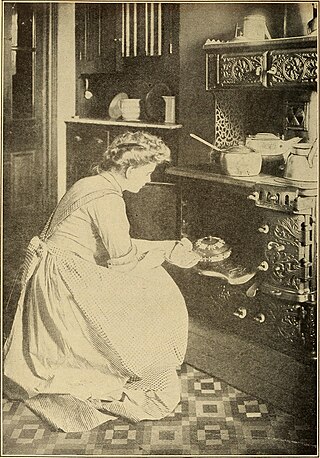
Unpaid labor or unpaid work is defined as labor or work that does not receive any direct remuneration. This is a form of non-market work which can fall into one of two categories: (1) unpaid work that is placed within the production boundary of the System of National Accounts (SNA), such as gross domestic product (GDP); and (2) unpaid work that falls outside of the production boundary, such as domestic labor that occurs inside households for their consumption. Unpaid labor is visible in many forms and isn't limited to activities within a household. Other types of unpaid labor activities include volunteering as a form of charity work and interning as a form of unpaid employment. In a lot of countries, unpaid domestic work in the household is typically performed by women, due to gender inequality and gender norms, which can result in high-stress levels in women attempting to balance unpaid work and paid employment. In poorer countries, this work is sometimes performed by children.

Project Gaia is a U.S.-based non-governmental, non-profit organization engaged in developing alcohol-based fuel markets for household use in Ethiopia and other developing countries. The organization identifies alcohol fuels as a potential alternative to traditional cooking methods, which they suggest may contribute to fuel shortages, environmental issues, and public health concerns in these regions. Focusing on impoverished and marginalized communities, Project Gaia is active in Ethiopia, Nigeria, Brazil, Haiti, and Madagascar. The organization is also planning to expand its projects to additional countries.

A domestic robot is a type of service robot, an autonomous robot that is primarily used for household chores, but may also be used for education, entertainment or therapy. While most domestic robots are simplistic, some are connected to Wi-Fi home networks or smart environments and are autonomous to a high degree. There were an estimated 16.3 million service robots in 2018.
The valuation of nonmarket housework comprises attempts to attach value to non-exchange domestic tasks. Housework may include a variety of activities, particularly those traditionally associated with housekeeping, along with child care and nurturing. These activities have recognizable economic and social significance, but are not included in standard economic measurements, such as the gross domestic product (GDP). While the symbolic or subjective benefits of housework are difficult to measure, various attempts have been made to attach value to economically productive household activity.

One aspect of energy poverty is lack of access to clean, modern fuels and technologies for cooking. As of 2020, more than 2.6 billion people in developing countries routinely cook with fuels such as wood, animal dung, coal, or kerosene. Burning these types of fuels in open fires or traditional stoves causes harmful household air pollution, resulting in an estimated 3.8 million deaths annually according to the World Health Organization (WHO), and contributes to various health, socio-economic, and environmental problems.
